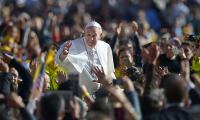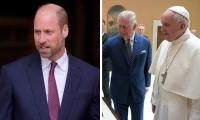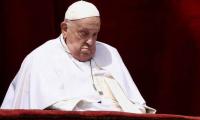ISLAMABAD: The International Olympic Committee (IOC) has extended dates of qualifying rounds till June 21, 2021 following the rescheduling of Tokyo Olympics that will now be held from July 23 to August 8, 2021.
In a teleconference organised by the IOC Thursday evening with their top brass (which was also participated by The News) it was revealed that the new dates for completion of all qualifying rounds for Olympics will now be June 21, 2021. Majority of qualifiers are yet to get completed and these include judo, karate, wrestling, taekwondo, weightlifting, gymnastics and hosts of other sports.
The teleconference was attended among others by James Macleod, NOC and Olympic Solidarity Director, Christopher Dubi, Olympic Games Executive Director and Kit McConnell Sports Director. It was revealed that all qualifying rounds’ dates will be extended and communicated to the NOCs in due course.
“It is a very complex event to organise, and its postponement is a real challenge. It is like a huge jigsaw puzzle where every piece is important and must fit together. It is the responsibility of the Tokyo 2020 Coordination Commission to work with all the stakeholders involved, starting with the Organising Committee Tokyo 2020, the 33 international federations, the 206 National Olympic Committees, athletes, sponsors and broadcasters to work on all the questions coming from the decision taken to postpone the Olympic Games Tokyo 2020,” Dubi said.
Comparisons are always dangerous as they can be interpreted in different ways.
To a question on previous postponements of Olympics due to World War I and II, he said: “To compare a postponement with a cancellation due to two world wars would not be right, considering the losses and human suffering that a war brings with it. What we can say is that it is an unprecedented crisis for humanity, as we have never seen such spread of a virus before, and an unprecedented challenge for the Olympic Games.”
“The IOC president addressed the athletes in several letters. There were also several calls between our Athletes’ Commission and many athlete representatives around the world, and a phone call with more than 200 athlete representatives and the IOC president. In this phone call, there was not a single voice asking for the cancellation of the Games. The questions revolved around the qualification system, the training conditions, mental health and other issues. We took all of this into consideration, plus the many voices of athletes that we heard from around the world who were not in this call. Some were critical, and others were very supportive. This is normal in this very difficult situation of uncertainty,” Dubi said about the reasons that forced IOC to postpone the Games.
Barcelona's Polish forward Robert Lewandowski leaves the pitch injured against Celta Vigo. —AFPBARCELONA:...
Arsenal's Leandro Trossard celebrates after scoring against Ipswich.—AFPUNITED KINGDOM: Arsenal made Liverpool wait...
Representational image shows Martial Arts. — AFP/FileISLAMABAD: The trials for season 4 of the Mixed Martial Arts ...
Sampdoria fans are rallying behind their team and against relegation to Serie C. —AFP/FileITALY: Sampdoria are...
Wu Ashun in action. —AFP/FileSHANGHAI: Home favourite Wu Ashun charged to a second Volvo China Open triumph on...
Manchester City's Kevin De Bruyne celebrates with the trophy after winning the Premier League. —Reuters/FileLONDON:...







